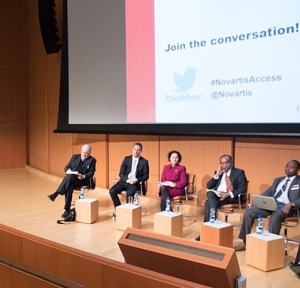Novartis eyes PPP projects in Vietnam
 |
| Regional participants discussed about how to shape access to healthcare in Asia |
Deborah Gildea, head of Novartis Social Business Asia, confirmed this information to VIR at its regional stakeholder meeting in Singapore held in late November. During the event, participants from Singapore, Bangladesh, Indonesia, Vietnam, and others discussed how public-private partnerships, digital health, innovative financing, and insurance solutions can help shape access to healthcare in Asia.
"At present, we are working with the MoH on the possibilities of carrying out a PPP project. We have had first level of discussions with the MoH so far," she said. "Through the PPP project, we want to provide services to help the primary healthcare sector increase service quality," she added.
Currently, the MoH is working on creating a legal framework for PPP to encourage private investment in the future.
Addressing the meeting, Nguyen Khanh Phuong, head of the MoH's Health Strategy and Policy Institute, shared information about Vietnam's PPP legal framework in the healthcare sector.
"There are some significant achievements in PPP, including the provision of health services, perhaps the most significant being the engagement of private providers in contracts with social health insurance. At present, 26 per cent of contractors with social health insurance come from the private sector. Additionally, private providers are engaged in some publicly-funded programmes, such as the non-communicable diseases (NCDs) programme."
Realising the unmet demand among locals and the government's strategies to increase access to primary healthcare for rural people, NSB is mostly focusing on low income earners.
"NSB is providing value by selling medicine. With this comes the responsibility of researching innovative medicines and making them accessible to most of the global population. NSB targets low-middle income countries because they are the most vulnerable population segments to health risks. Hence, it makes good business sense to target them," said Harald Nusser, head of NSB.
"Killer diseases like non-communicable diseases for example, dominantly affect low-middle income countries and the more vulnerable layers of the population. That is the reason why we need models that also commercially work for these populations," he added.
Vietnam is one of the fastest growing economies in Asia and has a burgeoning population. Despite improvements in the health of its population, poverty and inequality remain high, especially in rural areas. Nearly 70 per cent of the country's 90 million population live in rural areas and struggle with healthcare access, affordability, and quality.
In Vietnam, Novartis Social Business has implemented and been running two programmes for a long time now. One of them is the renowned Cung Song Khoe programme. NSB successfully worked with the Department of Health to develop this programme at a community level and launched it in 2012 to provide health awareness, education, and affordable quality medicines. To date, the Cung Song Khoe programme has reached more than 930,000 people, providing basic health education and screening for the prevention of diseases such as diabetes and hypertension.
Deborah Gildea added, “This programme has been in place for five years now. By the end of 2018, Novartis would have served 1 million people by providing health education and diagnostics services. This programme is made sustainable by making medicines and services available locally.”
 | Vietnam to attend Novartis regional stakeholder event in Singapore Building on the series of global stakeholder dialogues, Novartis Social Business will be hosting its fourth event in Singapore on November 20, 2018. |
 | Novartis to part with Roche Swiss drug-maker Novartis is working with investment banks to line up potential buyers for its 13.5 billion francs’ ($14 billion) worth stake in Roche, according ... |
 | Novartis joints goal of improving Vietnam’s healthcare system Ninety-four delegates from 19 countries gathered yesterday for the 8th Asia Pacific Future Trends Forum to discuss key healthcare policy issues and share best practices ... |
What the stars mean:
★ Poor ★ ★ Promising ★★★ Good ★★★★ Very good ★★★★★ Exceptional
 Tag:
Tag:
Related Contents
Latest News
More News
- Hermes joins Long Thanh cargo terminal development (February 04, 2026 | 15:59)
- SCG enhances production and distribution in Vietnam (February 04, 2026 | 08:00)
- UNIVACCO strengthens Asia expansion with Vietnam facility (February 03, 2026 | 08:00)
- Cai Mep Ha Port project wins approval with $1.95bn investment (February 02, 2026 | 16:17)
- Repositioning Vietnam in Asia’s manufacturing race (February 02, 2026 | 16:00)
- Manufacturing growth remains solid in early 2026 (February 02, 2026 | 15:28)
- Navigating venture capital trends across the continent (February 02, 2026 | 14:00)
- Motivations to achieve high growth (February 02, 2026 | 11:00)
- Capacity and regulations among British areas of expertise in IFCs (February 02, 2026 | 09:09)
- Transition underway in German investment across Vietnam (February 02, 2026 | 08:00)






















 Mobile Version
Mobile Version